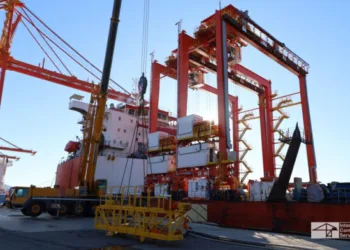When you strip away the tech jargon, the trucking industry still runs largely the way it always has through a flurry of phone calls, email threads, and messages between brokers and carriers trying to cover loads.
Despite an explosion of logistics technology, nearly 80% of U.S. truckload bookings are still made. Primarily via phone and email.
FleetWorks CEO and co-founder Paul Singer says in an interview with FreightWaves, “Carriers have a hard time sharing where they are and where they want to go, and brokers aren’t always forthcoming with all the information.”
Join the leaders shaping freight’s future at
F3: Future of Freight Festival, Oct 21-22.
Network with the industry’s best and discover what’s next.
This lack of transparency has kept freight matchmaking stuck in a loop of inefficiency, a system that FleetWorks now aims to modernize with artificial intelligence.
FleetWorks which officially launched its always-on AI dispatcher for carriers alongside $17 million in new funding. The always-on dispatcher is taking a dual-sided approach to freight automation. One AI agent works for carriers, learning their preferences, equipment, and availability to find ideal freight. The other serves brokers, identifying the best available truck for every shipment. When the two meet, Singer said, “it allows for stronger match facilitation — something that reduces the mountain of calls to a single, seamless interaction.”
With $17 million in new funding led by First Round Capital and participation from Y Combinator, Saga Ventures, and LFX Venture Partners, FleetWorks plans to scale its teams in San Francisco and Chicago, focusing on engineering and go-to-market growth. “We’re looking for the top 1% of talent,” Singer said. “The priority is continuing to build awareness, especially on the carrier side.”
But AI isn’t here to replace people in freight, it’s here to make them smarter and faster. “It’s a lot less about order-taking now and more about problem-solving,” Singer said. “We’ve seen reps making 50% more outbound calls instead of waiting for inbound calls. You have to change the work you’re doing. It has to be smarter and data-driven.” One FleetWorks customer saw a single rep book 50 to 60 loads a day using the platform, a productivity level previously out of reach.
That performance boost comes with measurable returns. “We’re seeing about a 30% lift in loads per day per person,” Singer noted. “And we see anywhere from a 1–4% gross margin expansion on those loads. That’s where our customers get a huge amount of ROI — they’re actually making more money per shipment.”
FleetWorks also addresses one of the industry’s most persistent pain points: trust. Every broker within FleetWorks is pre-verified with a track record of reliability, while carrier vetting happens through partnerships like Highway, which verifies key details such as insurance coverage.
“We take the things that diligent brokers are already doing and incorporate them into the process,” Singer said. A carrier management team reviews the AI’s actions and audits outcomes, maintaining a full trail of accountability. “The AI takes autonomous actions, but they’re all reviewable,” he emphasized.
Integration has been another key differentiator. “On the broker side, average onboarding time is a week, sometimes as quick as four hours,” Singer said. “It fits right into existing systems. You don’t have to adopt a new interface.” Carriers, meanwhile, can be onboarded in minutes. “A carrier comes on, one AI agent qualifies them, another calls their insurance provider to verify coverage, and another checks if they’re already in the network. It’s dozens of agents working together to make things happen.”
FleetWorks’ AI has even cracked one of logistics’ most frustrating technical hurdles, navigating automated phone trees. “We have a 96% success rate on AI navigating phone trees,” Singer said.
“What we’re doing with FleetWorks is in some ways new, but in many ways it’s embracing the way carriers and brokers already want to work. The carrier wants to text, call, WhatsApp; we can do that. We meet them where they are.”
The post Fleetworks’ $17 million funding fuels AI dispatcher innovation appeared first on FreightWaves.



















